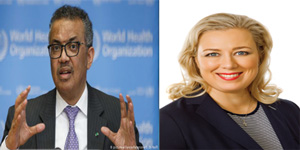
Letter to the Editor on Phosphate Editorial
Dear Mr. Steinmann
Your latest editorial on 15 July 2016 comes to the conclusion that “Phosphate is the commodity that will save the world”. It must have left readers dumbfounded.
Of course phosphate is essential to life, being for example a vital “ingredient” of our DNA. However, that does not mean that we can just go and carve everything up to get phosphates. So the question is not so much whether it is an essential element, but whether its use in various agricultural and food industries is necessary and healthy. And of course how its harvesting harms the environment.
Your editorial indicated that you had already read some publications. Your conclusion from those readings is: “The world’s producers of food need phosphate. No phosphate no fertiliser. No fertiliser no dreams of intensive cultivation. This will lead to upheavals and riots ala Venezuela ”. Do you sincerely want to convince your readers that no phosphate will result in riots? Then your editorial ends with this: “The phosphate in the world’s seabeds is … the only solution”. And consequently your editorial heading, the world is doomed without phosphate!
Taken to its logical conclusion your argument boils down to marine phosphate mining must be allowed come hell or high water otherwise riots will ensue because no food will be produced due to the lack of phosphate to supply fertiliser and the end of the world is nigh.
Health impacts of phosphate
Perhaps you should consult authorities on the health impacts of phosphate and especially its consequences on agriculture. An article entitled “Phosphate and Food Security” was published in the Namib Times of 9 July 2013. It was written in response to the claims by phosphate mining companies that marine phosphate mining would become a major contributor towards food security in Namibia. Experts will be able to demonstrate the reason why Namibia has a problem with food security. It is because our country is a dry land with extremely varying weather patterns. In addition, the sandy soils have very low water holding capacity. One can apply all the fertilizer in the world but without adequately spaced rain, the crop will give low yields.
Surely you must be aware of the critical situation prevailing in vast areas of our country because of the sustained drought and its devastating effects on so many sections of our communities and economy. Photos of drought-stricken crop fields fill our newspapers daily. Fertilisers will not save these crops – nor future ones.
Phosphate alone can not produce crops
The Namibia Agriculture Forum will certainly be able to confirm the capacity of fertiliser usage in Namibia annually under normal climatic conditions. Chemical phosphate alone would not miraculously produce crops. The United Nations Environmental Programme has declared that organic agriculture (which does not use chemical phosphate fertiliser) is the only way to increase crop food security in Africa. The analysis of 114 farming products in 24 African countries showed that organic practices increased yield by 100%.
The fact is that fish can directly feed the poor without any processing and it is a natural, sustainable, long-term gift towards food security in a dry land nation like Namibia. It seems rather short sighted to mine marine phosphate for fertiliser while at the same time destroying a long term source of food security (fish) and causing a plethora of long term health effects and pollution.
Effects of extensive fertiliser use
One FAO study that may have escaped your attention provided evidence of the effects of extensive fertiliser use on the human environment. Its overuse in agriculture that then end up in a concentrated format in the food chains can cause a range of health effects including kidney damage, bone damage, lung conditions, anaemia, neurological symptoms, organ damage, birth defects and cancer.
But what is even more disturbing in your editorial is your declaration that “eventually the power of investment will override our environmental sensibilities”. With that you draw a line through the significant constitutional principle that demands maintaining ecosystems for the benefit of Namibians, both present and future. Your view conflicts directly with the position taken by our President when he declared in no uncertain terms in New York on 22 April 2016 that the “environment is part and parcel of Namibia’s foundation of democracy, peace and stability.
Yours sincerely
Swakopmund Matters
Letter shortened – Ed.










































